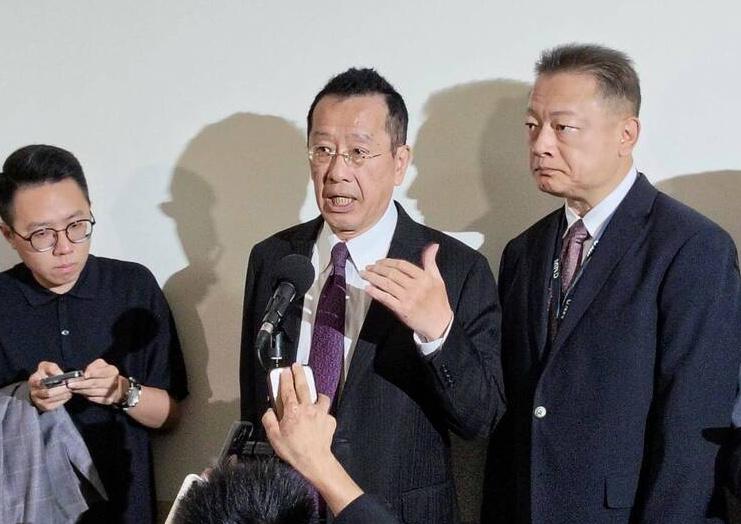Minister of National Defense Wellington Koo (顧立雄) today said that it would be "extremely challenging" for a local shipbuilder to meet next month's deadline for the delivery of an indigenous submarine prototype.
"We still have full confidence that the submarine will be successfully built, but the necessary tests and fine-tuning will take time," Koo told reporters when asked about the progress of the prototype, known as the Narwhal or Hai Kun (海鯤).

Photo: Tien Yu-hua, Taipei Times
Pre-sea trial tests are now being conducted on the prototype, he said on the sidelines of a closed-door session of the legislature's Foreign Affairs and National Defense Committee, at which lawmakers were briefed on the latest developments in the Hai Kun project.
Given the early stages of the testing, it would be "extremely challenging" for the builder to deliver Taiwan's first indigenous submarine by next month's deadline, Koo said.
After the legislative session, the navy in a statement said that the prototype trials so far have consisted of three rounds at shallow depths only.
The navy also said it is working closely with the builder, CSBC Corp, Taiwan, on the submarine's power management system and its integrated platform management system.
The three stages of a submarine's sea trials are surface navigation, shallow-depth testing and gradual-depth increase testing.
In shallow-depth testing, the submarine submerges to a limited depth to test basic systems.
During gradual-depth increase tests, the submarine submerges further, testing systems under varying pressures and depths to ensure it would meet its combat requirements, CSBC said.
According to the timeline set earlier by the Ministry of National Defense, the Hai Kun's sea trials were scheduled to begin in April and be completed by Sept. 30 to meet a November delivery deadline.
Under the Indigenous Defense Submarine project, a second submarine is scheduled to be built by 2027.
The goal is to ensure that the navy has a total of four submarines by 2027.

The first global hotel Keys Selection by the Michelin Guide includes four hotels in Taiwan, Michelin announced yesterday. All four received the “Michelin One Key,” indicating guests are to experience a “very special stay” at any of the locations as the establishments are “a true gem with personality. Service always goes the extra mile, and the hotel provides much more than others in its price range.” Of the four hotels, three are located in Taipei and one in Taichung. In Taipei, the One Key accolades were awarded to the Capella Taipei, Kimpton Da An Taipei and Mandarin Oriental Taipei. Capella Taipei was described by

EVA Airways today confirmed the death of a flight attendant on Saturday upon their return to Taiwan and said an internal investigation has been launched, as criticism mounted over a social media post accusing the airline of failing to offer sufficient employee protections. According to the post, the flight attendant complained of feeling sick on board a flight, but was unable to take sick leave or access medical care. The crew member allegedly did not receive assistance from the chief purser, who failed to heed their requests for medical attention or call an ambulance once the flight landed, the post said. As sick

Minister of Economic Affairs Kung Ming-hsin (龔明鑫) yesterday said that private-sector refiners are willing to stop buying Russian naphtha should the EU ask them to, after a group of non-governmental organizations, including the Centre for Research on Energy and Clean Air (CREA), criticized the nation’s continued business with the country. While Taiwan joined the US and its Western allies in putting broad sanctions on Russia after it invaded Ukraine in 2022, it did not explicitly ban imports of naphtha, a major hard-currency earner for Russia. While state-owned firms stopped importing Russian oil in 2023, there is no restriction on private companies to

INDUSTRY: Beijing’s latest export measures go beyond targeting the US and would likely affect any country that uses Chinese rare earths or related tech, an academic said Taiwanese industries could face significant disruption from China’s newly tightened export controls on rare earth elements, as much of Taiwan’s supply indirectly depends on Chinese materials processed in Japan, a local expert said yesterday. Kristy Hsu (徐遵慈), director of the Taiwan ASEAN Studies Center at the Chung-Hua Institution for Economic Research, said that China’s latest export measures go far beyond targeting the US and would likely affect any country that uses Chinese rare earths or related technologies. With Japan and Southeast Asian countries among those expected to be hit, Taiwan could feel the impact through its reliance on Japanese-made semi-finished products and